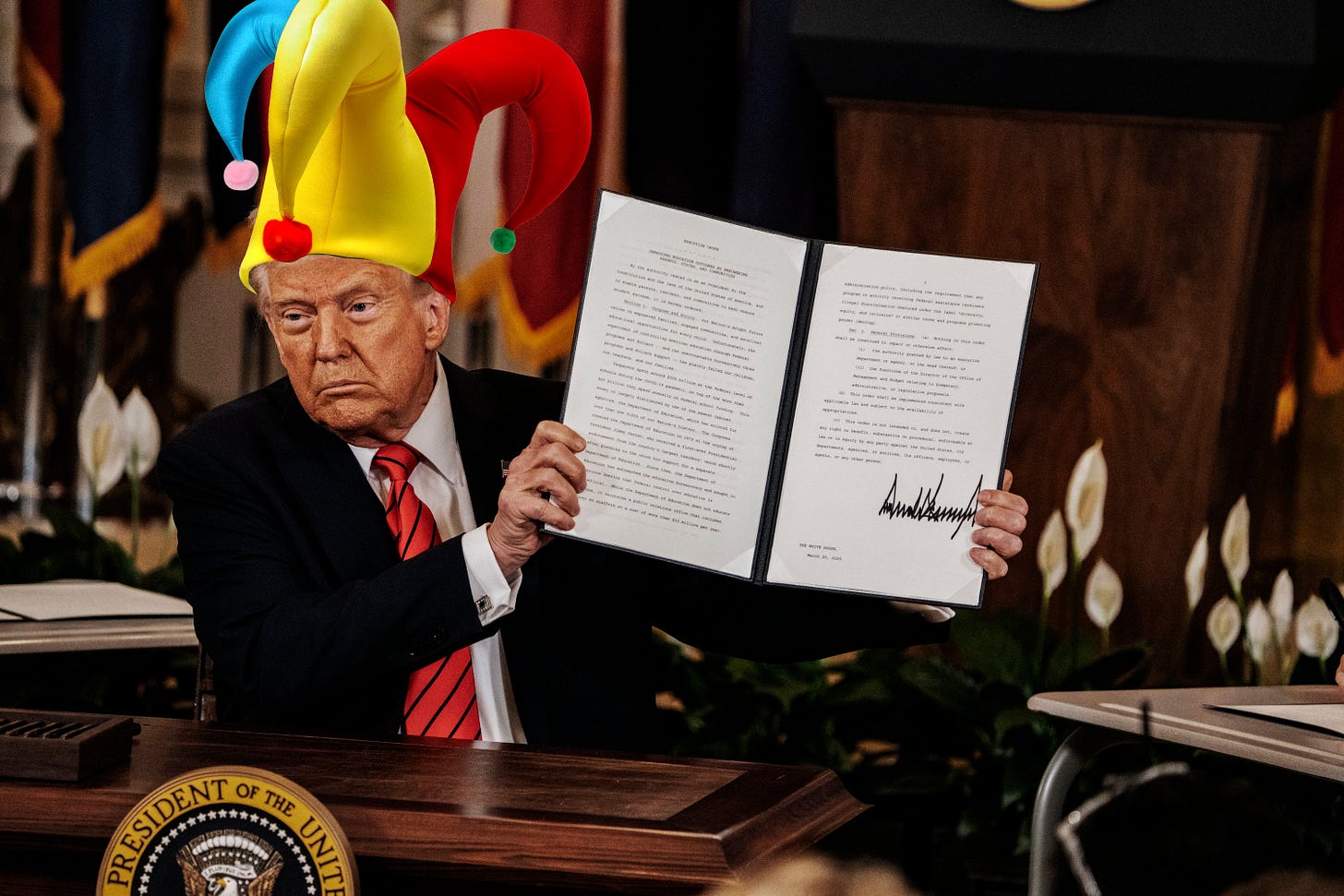
Fractured Families: A Second Trump Term Threatens Migrant Children
April 23, 2025
Ryan Coogler Didn’t Want to Hide Anymore
April 23, 2025Hi, folks, it’s Will, sitting in for JVL today.
Yesterday Sam wrote about a recurrent problem in the Trump administration: It’s run by idiots.
The list Sam compiled is impressive: launching a global trade war based on bogus math; yapping about military plans on a Signal chat that included the editor of the Atlantic; inadvertently firing the people in charge of nuclear weapons security; and a lot more.
Yes, Trump and his accomplices are malicious. Yes, they’re corrupt. Yes, they’re dangerous. But they’re also profoundly stupid, and their stupidity is hurting or worrying a lot of people who voted for Trump.
So here’s my pitch: To break Trump’s coalition and reclaim our government, we need to talk not just about the administration’s corruption and its abuse of power, but about its pervasive incompetence.
Let me show you some polls.
Start with last fall’s election. In the VoteCast survey of the 2024 electorate, 44 percent of voters said Trump bore “a lot” of responsibility for his supporters’ violence on January 6th. That was the harshest answer they were allowed to give. People who chose that answer said they voted for Kamala Harris, 92 percent to 7 percent.
That’s pretty solid. But you know what scored better? Forty percent of voters said Harris was more capable of handling the economy than Trump was. And those people voted for her by 97 percent to 2 percent.
On the merits, you might expect the numbers to tilt the other way. Trump attempted a violent coup! Shouldn’t that instantly disqualify him? But to most voters, it didn’t. Americans were more likely to vote against Trump if they doubted his economic management than if they believed he had launched an assault on the Capitol.
You could tear your hair out over this. But there’s another way to look at it: Trump has, in fact, handled the economy badly since he returned to office. And people know it. In an Economist/YouGov poll published today, 57 percent of American adults said Trump’s actions on the economy have hurt the country; only 24 percent said they’ve helped. Fifty-two percent said his actions on foreign policy have hurt the country; only 28 percent said they’ve helped.
Bottom line: People who don’t care about Trump’s authoritarianism—and who voted for him because they thought he’d be competent—might now be persuaded to stay home or vote for the opposition.
Donald Trump’s talent is exploiting popular resentments and prejudices. Twice now, he has translated that into presidential victories. His problem is what to do after he wins. He can sit at his desk—or in his golf cart, or in front of a TV—and watch other people execute scripted plans such as Project 2025. But where presidential judgment is required, Trump lacks the wisdom, patience, and work ethic to figure out how to pursue his objectives effectively or judiciously. He’s an oaf.
The result, politically, is a gap between public support for his goals and public support for his methods.
Tariffs are a clear example. Trump could have marshaled our allies in a united front against China’s worst trade practices. Instead, he launched a preposterous trade war against the whole world. He crashed the financial markets and had to back down.
You can see the results in two polls taken earlier this month, a few days after he announced his tariffs. In a CBS News/YouGov survey, 51 percent of Americans said they liked Trump’s goals in pursuing tariffs, but 63 percent didn’t like “the way he is going about it.” In a Harvard-Harris poll, voters split three ways. Forty-eight percent said Trump’s tariffs were “the right idea” but “required more patience.” On the other side, 31 percent said the tariffs were “the wrong idea regardless of execution.” The pivotal group, 21 percent, said the tariffs were “the right idea but it has been executed badly.”
This is a key to unlocking the Trump coalition: When the question is execution instead of goals, the middle of the electorate turns against him.
And when the damage hits people in the wallet, he can’t hide it. In the Harvard-Harris poll, voters were more than twice as likely to say they’d been hurt by Trump’s tariffs (38 percent) as to say they’d been helped (15 percent). In a CBS poll taken in late March, more respondents said Trump was costing America jobs (48 percent) than said he was creating jobs (33 percent).
The same pattern shows up on issue after issue.
Take DOGE. Elon Musk and his collaborators have chainsawed their way through federal agencies, gutting or crippling programs that even many Trump supporters recognize as important. And the Harvard-Harris poll found that while voters like the DOGE concept, they don’t like the results.
The poll asked: “To reduce the budget deficits, do you think we mostly need to reduce government expenditures or to increase taxes?” Overwhelmingly, 78 percent to 22 percent, voters preferred to reduce spending.
Then the poll asked: “Do you think that the government expenditures are basically fair and reasonable, or do you think they are filled with waste, fraud and inefficiency?” Again, voters agreed with DOGE: 62 percent said the expenses were full of waste, fraud, and inefficiency.
But when the question turned to methods, the balance shifted: 55 percent of voters said Musk and DOGE were cutting government expenses “the wrong way.” Among independents, the shift was even bigger: Two-thirds agreed that government expenditures were full of waste, fraud, and inefficiency, but 60 percent said Musk and DOGE were cutting them the wrong way.
A Wall Street Journal poll taken in late March and early April found a similar split: 42 percent of registered voters said Trump “should keep going” with his cuts, 20 percent said he should stop, and the pivotal bloc—37 percent—favored cuts but said they “don’t like the way President Trump is going about doing it.”
Deportations are a different issue. But here, too, Americans are beginning to see the administration’s clumsiness. Exhibit A is the case of Kilmar Abrego Garcia: Even the government’s lawyers have admitted that his deportation was an “administrative error.”
Polls tend to find broad support for the idea of deporting illegal immigrants, especially criminals. But a lot of people think Trump is botching the job. In the new Economist/YouGov survey, 59 percent of Americans said the government was making more than a few “mistakes in who it is deporting.” Fifty percent said Trump should bring Abrego Garcia back to the United States; only 28 percent said he shouldn’t.
The poll also asked respondents to choose between two statements. One was: “The government should try to solve problems as quickly as possible, even if that means they might make more mistakes.” The other statement was: “The government should try to solve problems carefully, making as few mistakes as possible, even if that means they might solve the problem more slowly.” Given that choice, 81 percent of respondents preferred to go slower and make fewer mistakes.
Let’s look at one more topic: national security.
How did we discover the administration’s reckless yapping about military operations? The only reason was that Jeffrey Goldberg, the editor of the Atlantic, was put on a Signal chat where it happened. If he hadn’t been a journalist, we probably wouldn’t have heard about it.
So there was every reason to suspect that the yapping had occurred on other unsecured chats or channels. And sure enough, we learned this week of another incident. There could be many more.
This kind of carelessness can get service members killed. And that’s why it provokes anger across party lines.
In a Quinnipiac survey taken earlier this month, 61 percent of registered voters, including 32 percent of Republicans, said “someone in the Trump administration should lose their job over the Signal group chat incident.” And in a Harvard-Harris poll taken in late March, 54 percent of voters, including 41 percent of Republicans, specifically agreed that National Security Advisor Mike Waltz, who brought Goldberg into the chat, should be fired.
After wading through all this political analysis, I feel like I need a bath. Shouldn’t we stand for justice, regardless of the polls? As Tim put it on Monday, regarding the deportations:
we are at a hinge point in history. The president has tried . . . to disappear people based solely on their nation of origin and their self-expression. If he succeeds at defying the courts and keeping these men in a foreign gulag, who knows who will be targeted next.
Everyone who has any influence or ability to stop or stall this affront to our constitutional order, the rule of law, and basic rights has an obligation to do so.
I can’t argue with that. Sometimes you have to speak up against evil regardless of the politics.
And I wish that were enough. I wish more Americans had recognized the evil Trump represented when he ran for president in 2016. I wish they had recognized it when he ran again in 2024. I wish they recognized it now. We would be a better, safer country if more of our people cared enough about the Constitution and the rule of law to reject this tyrant and his party.
But that’s not the world we live in. Kamala Harris tested the proposition that there were enough of us. And she came up short.
We need to reach beyond the audience that shares our values. We need to reach people who don’t agree with us on much but who recognize stupidity when they see it—and are willing to throw the bums out.
Great Job Will Saletan & the Team @ The Bulwark Source link for sharing this story.





